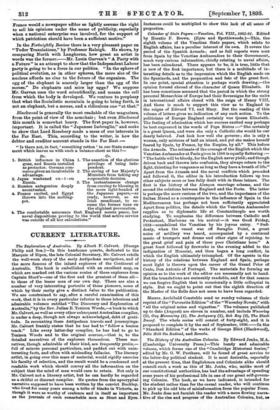Calendar of State Papers. — Venetian, Vol. VIII., 1581 - 91. Edited by Horatio
F. Brown. (Eyre and Spottiswoode.)—This, the eighth volume of the Venetian State papers, which relate to English affairs, has a peculiar interest of its own. It covers the period of the Spanish Armada; and as full reports were sent from Spain by the Venetian Ambassadors to their Government, much very curious information, chiefly relating to naval affairs, has been calendared. There appears to be, it is true, little that is new of the first importance, but there is a multitude of in- teresting details as to the impression which the English made on the Spaniards, and the preparation and fate of the great fleet. In one point, special attention is perhaps worth drawing,—the opinion formed abroad of the character of Queen Elizabeth. It has been sometimes assumed that the period in which the strong personal Monarchies of Europe had their Sovereigns for the units in international affairs closed with the reign of Henry VIII. And there is much to support this view as to England in the reigns of Edward VI. and Mary. But the reading of this volume of letters gives no indication of any such notion. To the politicians of Europe England certainly was Queen Elizabeth. The feeling of admiration which her success excited may perhaps be best expressed in the words of Pope Sixtus :—" She certainly is a great Queen, and were she only a Catholic she would be our dearly beloved. Just look how well she governs ; she is only a woman, only mistress of half an island, and yet she makes herself feared by Spain, by France, by the Empire, by all." This before the Armada. The estimate of the courage of the English which the Venetian Ambassador at Paris gives in 1588 is equally flattering:— "The battle will be bloody, for the English never yield; and though driven back and thrown into confusion, they always return to the fight, thirsting for vengeance as long as they have a breath of life." Apart from the Armada and the naval conflicts which preceded and followed it, the editor in his introduction follows up two other subjects more or less fully dealt with in these letters. The first is the history of the Aleneon marriage scheme, and the second the relations between England and the Porte. The latter is perhaps the more curious of the two, and the importance of the Sultan Murad as a counterpoise to the influence of Spain in the Mediterranean has perhaps not been sufficiently appreciated Apart from politics, the details which the Venetian Ambassador supplies as to diplomatic life at Constantinople are worth studying. To emphasise the difference between Catholic and Protestant, Harborne on his arrival—it was Good Friday, 1583—scandalised the Venetian by his joyous entry. " Sud- denly, when the vessel was off Seraglio Point, a great noise of artillery was heard, accompanied by a continual music of trumpets and drums and other signs of rejoicing. to the great grief and pain of these poor Christians here." A great feast followed by fireworks in the evening added to the indignation of Moresini, and then began a long conflict, in, which the English ultimately triumphed. Of the agents in the history of the relations between England and Spain, perhaps most light is thrown upon the career of the Grand Prior of Crato, Don Antonio of Portugal. The materials for forming an opinion as to the work of the editor are necessarily not to hand. But the translations are eminently readable, and for that reason we can forgive English that is occasionally a little colloquial in style. But we ought to point out that the eighth direction of the Master of the Rolls does not seem to have been regarded.


































 Previous page
Previous page